|
|
|
Sort Order |
|
|
|
Items / Page
|
|
|
|
|
|
|
| Srl | Item |
| 1 |
ID:
171817


|
|
|
|
|
| Summary/Abstract |
In the aftermath of the EU’s diplomatic mission to resolve the Orange Revolution in 2004, several Russian policy makers perceived the EU as an aggressive actor which sought to undermine Russia’s influence in the post-Soviet space. About a decade later, Russian policy makers are mocking the EU’s limited abilities in the ongoing Ukraine crisis. The purpose of this article is to explain the reasons for this change of the EU’s abilities by focusing on its state-building in Ukraine. The article examines the EU’s state-building initiatives in Ukraine between November 2013 and July 2015. The article assesses the factors which shape the EU’s state-building in Ukraine. It argues that the EU’s state-building was hampered by two interrelated factors. First, the EU did not possess the policy tools to counter-balance Russia’s affirmative foreign policy towards Ukraine which was reflected in Crimea’s annexation to Russia. Second, as a consequence, this annexation turned Ukraine into a case of contested statehood.
|
|
|
|
|
|
|
|
|
|
|
|
|
|
|
|
| 2 |
ID:
131178
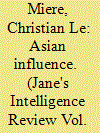

|
|
|
| 3 |
ID:
132144
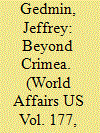

|
|
|
|
|
| Publication |
2014.
|
| Summary/Abstract |
Ukraine is lost. At least lost as many of us had once imagined it-as a potential member of the European Union and, perhaps one day, of NATO. Thank the Kremlin's visionary leader for that. It's striking how confidently and quickly Russian President Vladimir Putin gobbled up Crimea. Although it was a clear-cut case of unprovoked aggression, followed by annexation, the United States and its allies were unable to lift a finger.
|
|
|
|
|
|
|
|
|
|
|
|
|
|
|
|
| 4 |
ID:
132082
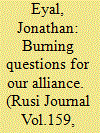

|
|
|
|
|
| Publication |
2014.
|
| Summary/Abstract |
Russia's annexation of Crimea and its actions in eastern Ukraine have led to a fundamental shift in Europe's security environment. Jonathan Eyal argues that NATO will have to find a way to reassure its Eastern European members without repudiating existing structures for co-operation with Russia.
|
|
|
|
|
|
|
|
|
|
|
|
|
|
|
|
| 5 |
ID:
188171
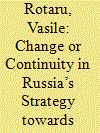

|
|
|
|
|
| Summary/Abstract |
The 2008 invasion of Georgia, followed by the recognition of the independence of the breakaway regions of Abkhazia and South Ossetia, the annexation of Crimea and the involvement in the war in Donbas, and the 2022 invasion of Ukraine have all marked the return to active Russian participation in separatist regions in the ‘near abroad’. They took the international community by surprise. To be sure, the Russian Federation had played a role in all previous secessionist conflicts in the former Soviet space. Nonetheless, Moscow’s post-2008 bold actions – open invasion, recognition of separatist regions and annexation of a neighbour’s territory – have marked an innovation in Russia’s foreign policy. This points to questions about how Moscow is legitimising these actions and whether the official narrative suggests a change in Russia’s strategy towards secessionist conflicts in the ‘near abroad’.
|
|
|
|
|
|
|
|
|
|
|
|
|
|
|
|
| 6 |
ID:
144793
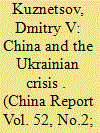

|
|
|
|
|
| Summary/Abstract |
This article examines China’s position on the Ukrainian ‘Euromaidan’ crisis over Crimea, on the war in the southeast of Ukraine and on sanctions against Russia. A complex set of reasons (economic, political and geopolitical) have caused heightened interest on the part of China in the events in the Ukraine. From the start, China kept a very low profile and right up to late February 2014, made no strong statements on the crisis in Ukraine and shunned any diplomatic initiatives. Thereafter, China’s official stand began to exhibit increasingly frequent signs of anti-Western rhetoric, an indication of its position over the situation in Ukraine nudging closer to that of the Russian Federation. China has swung gradually, and somewhat ambiguously, towards support for Russia primarily due to geopolitical reasons. Also, China and Russia share the desire to put up a united front in response to attempts by the United States and other Western countries to impose their attitudes on other countries.
|
|
|
|
|
|
|
|
|
|
|
|
|
|
|
|
| 7 |
ID:
138724
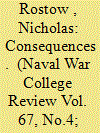

|
|
|
|
|
| Summary/Abstract |
This article examines possible consequences of U.S. and NATO withdrawal from Afghanistan, Russian annexation of Crimea and claims to territory inhabited by ethnic Russian citizens of other countries, and Chinese claims to control large adjacent areas of the Pacific Ocean. Fundamental principles of world public order are at risk or directly challenged in Afghanistan, Ukraine, and the western Pacific. They are not unique locations in this respect, but this article is not a review of all aspects of U.S. diplomacy and policy or of international relations since the end of the Cold War.
|
|
|
|
|
|
|
|
|
|
|
|
|
|
|
|
| 8 |
ID:
152690
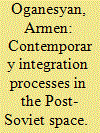

|
|
|
|
|
| Summary/Abstract |
THIS IS THE SEVENTH TIME we are meeting in Yalta for what has already become a traditional international conference organized by the journal International Affairs with support from the Ministry of Foreign Affairs. This time, our discussion is focused on the specifics of contemporary integration processes in the post-Soviet space. A quarter of a century has passed since the disintegration of the USSR and the formation of the CIS. This is a considerable historical period that gives us food for thought and discussion, as a result of which we could not only draw conclusions regarding the status quo of the Commonwealth but also outline its development paths for the future. At the same time, it is obvious that we are going through a very complex and dynamic stage that is leading to deeper integration.
|
|
|
|
|
|
|
|
|
|
|
|
|
|
|
|
| 9 |
ID:
138489
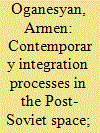

|
|
|
|
|
| Summary/Abstract |
ESTEEMED COLLEAGUES, today we are meeting here in Yalta for the fifth time at an annual conference organized by the International Affairs journal with support from the Russian Foreign Ministry. At our meetings we discuss the concept of "Eurasianism" both as an idea and as the realization of this idea on the practical level. Every year, our discussion brings something new to the understanding and assessment of integration processes in the post-Soviet space regarding a broad spectrum of political, economic and humanitarian ties. Every year, the makeup of our participants renews and expands both numerically and geographically. Every year, we say good-bye only to meet here on the Crimean land again next fall. Today, this conference is especially important for us, as it is taking place in totally new geopolitical conditions. We have gathered again in Yalta, in Crimea, but this time on Russian land. I am looking forward to a lively and productive discussion. I would like to give the floor to Dmitry Alexeevich Polyansky.
|
|
|
|
|
|
|
|
|
|
|
|
|
|
|
|
| 10 |
ID:
122780
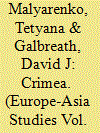

|
|
|
|
|
| Publication |
2013.
|
| Summary/Abstract |
While the breakup of Yugoslavia produced divided loyalties and competing claims, leading to the establishment of seven separate states ending with the de facto independence of Kosovo, Crimea was a source of geopolitical instability that threatened to engulf the region in ethnic and geopolitical conflict. As a result of the negotiations during the 1990s and a de facto settlement between Slavs and the Ukrainian state, between Slavs and returning Crimean Tatars, and between Ukraine and the Russian Federation, Crimea has remained a peaceful and even increasingly wealthy area of Ukraine. Reflecting on the case of Kosovo, this paper looks at the prospect for a similar conflict in and over Crimea. Our primary question concerns the degree to which the Kosovo case sheds light on a somewhat similar case of co-ethnics, religious differences and a weakened state. We argue that the greatest source of instability lies not with ethnic claims or geopolitics, but with Ukrainian political and commercial interests that threaten the de facto settlement between the region and the centre.
|
|
|
|
|
|
|
|
|
|
|
|
|
|
|
|
| 11 |
ID:
191815
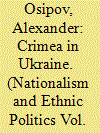

|
|
|
|
|
| Summary/Abstract |
From the early 1990s, Ukrainian Crimea seemed to face the Russian majority’s separatist inclinations and far-reaching political claims of the formerly deported Crimean Tatars. Nevertheless, the peninsula’s autonomous status secured ethnopolitical stability for about 19 years, and the article considers how the established regime of diversity governance contributed to the autonomy’s endurance. The author concludes that this regime did not fit into an explanatory framework of inter-group balance, such as power-sharing. Among the factors securing durablity were the ambiguity of official narratives, loosely formalized participatory mechanisms encouraging opportunisic behavior and the maintenace of the elites’ and population segments’ expectations.
|
|
|
|
|
|
|
|
|
|
|
|
|
|
|
|
| 12 |
ID:
146006
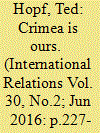

|
|
|
|
|
| Summary/Abstract |
Russia could have annexed Crimea anytime in the last 25 years. The fact that it did so only in March 2014 is a puzzle. I argue that the predominant discourse of Russian national identity by 2014 made the annexation of Crimea and military intervention in eastern Ukraine both thinkable and natural to Moscow. A history of the discursive terrain of Russia from 1992 to 2014 shows how Russia’s national identity has evolved over the years, both in response to Western inactions or actions and domestic developments. But Russian identity is not a sufficient explanation for Russian behavior in Ukraine. For that, we must pay attention to the event itself: Western support for the Maidan protestors, Western failure to adhere to the February 2014 agreements reached with Moscow on a transitional government in Ukraine with Yanukovych at its head and new elections in November, the presence of disgruntled Russians in Ukraine, and perhaps most important, over a decade of US unilateralism in foreign affairs.
|
|
|
|
|
|
|
|
|
|
|
|
|
|
|
|
| 13 |
ID:
130834
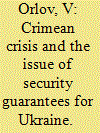

|
|
|
|
|
| Publication |
2014.
|
| Summary/Abstract |
The author offers opinions on the Budapest Memorandum, a 1994 agreement between Russia, Ukraine, Great Britain and the U.S. offering security guarantees for Ukraine in return for its nuclear disarmament. Citing the history of Ukraine's foreign relations since 1991, It is stated that since the U.S. and Great Britain have recognized the provision government created in 2014 while Russia has not, the Memorandum has no relevance to Russia's intervention in Crimea.
|
|
|
|
|
|
|
|
|
|
|
|
|
|
|
|
| 14 |
ID:
130838
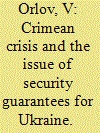

|
|
|
|
|
| Publication |
2014.
|
| Summary/Abstract |
The author offers opinions on the Budapest Memorandum, a 1994 agreement between Russia, Ukraine, Great Britain and the U.S. offering security guarantees for Ukraine in return for its nuclear disarmament. Citing the history of Ukraine's foreign relations since 1991, It is stated that since the U.S. and Great Britain have recognized the provision government created in 2014 while Russia has not, the Memorandum has no relevance to Russia's intervention in Crimea.
|
|
|
|
|
|
|
|
|
|
|
|
|
|
|
|
| 15 |
ID:
110151
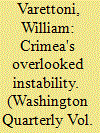

|
|
|
| 16 |
ID:
130891
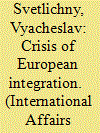

|
|
|
|
|
| Publication |
2014.
|
| Summary/Abstract |
Conferences organized by the journal in Yalta have already become a good tradition. It will be needless to speak of the significance that the Crimean land has for us: historically, ethnically, and mentally. Crimea is always a special place for Russia. There is no other area outside of Russia where so many Russian people live - Russian not only by ethnic origin, not only by blood, but also by spirit and mentality. We often
hear that Ukraine is going its own way, in accordance with its national interests. Of course, the choice of way is the right of every sovereign state. But many keep wondering about this. For example, at a recent meeting with local political analysts, the Chairman of the Council of Ministers of the Autonomous Republic of Crimea, Anatoly Mogilev, put the following question to the audience: "Will the signing of
the document in Vilnius become an irritating factor for Crimean society and lead to a destabilization of the situation?" The question is how to avoid de stabilization because nobody, whether in Moscow or in Kiev or especially in Crimea, is interested in it. No prediction of public behavior in this situation is yet available and we are looking forward to recommendations from the expert community.
|
|
|
|
|
|
|
|
|
|
|
|
|
|
|
|
| 17 |
ID:
174105
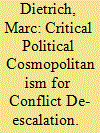

|
|
|
|
|
| Summary/Abstract |
The conflict-prone peninsula of Crimea is again—since its annexation—the theatre of new conflict scenarios. When it comes to understanding the de-escalation and increasing potential of complex hybrid conflicts, theories in international relations are too often trapped in their state-centred perspective. Meanwhile, the role of the individual actor, alone or organised, often remains underestimated as political and moral agent. In this essay, I shed light on a critical yet politically practicable individual-centring notion of cosmopolitanism, which is framed by a set of universal principles and provides alternative insights to conflict de-escalation scenarios in Crimea beyond limiting state-centric paradigms.
|
|
|
|
|
|
|
|
|
|
|
|
|
|
|
|
| 18 |
ID:
131018
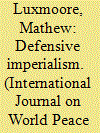

|
|
|
|
|
| Publication |
2014.
|
| Summary/Abstract |
This article examines Russia's approach to the post-Soviet space in relation to domestic stability during
I'utin's first two terms. It identi?es three dimensions of security which underpinned foreign policy during
this period-ideological, economic, and mi1itary~and demonstrates how each interacted with policies on the domestic front. Assessing Rnssia's response to Ukraine's Orange Revolution, it shows how the events of 2004 initiated a shift towards insulation from perceived external threats to political stability. A policy of "defensive imperialism" emerged whereby offensive actions abroad were aimed fundamentally at facilitating a stable external environment to politically safeguard the regime. The article concludes with a brief assessment of developments since 2008, and offers a pessimistic prognosis of the impact this trend will have on Russia's domestic stability and its international relations.
|
|
|
|
|
|
|
|
|
|
|
|
|
|
|
|
| 19 |
ID:
132148
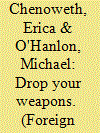

|
|
|
|
|
| Publication |
2014.
|
| Summary/Abstract |
Over the past three years, the world has witnessed a surge of nonviolent resistance movements. Pictures of huge demonstrations in public squares have become a staple of international news broadcasts, and Time named "the protester" as its Person of the Year for 2011. These days, it seems that at any given moment, thousands of people are mobilizing for change somewhere in the world.
|
|
|
|
|
|
|
|
|
|
|
|
|
|
|
|
| 20 |
ID:
131167


|
|
|
|
|
|
|
|